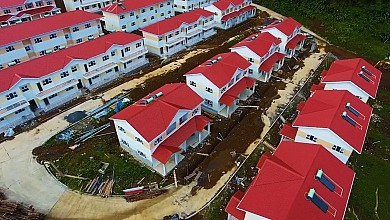Thanks to the Local Government Commissioner and his staff for offering me the opportunity to deliver some remarks at this special occasion during the observance of the 30th Anniversary of Local Government Month and the Department’s Long Service Award Ceremony.
Dominica has a unique model of Local Government, one based on the marriage of Local Development Administration and Community Development. This model traces its origin to the 1930s when the first town and village boards were established to foster the good government and development of their communities. Then in 1974, the responsibilities for community development was transferred from the Social Development Division to the Local Government Division and the establishment of the Department of Local Government and Community Development was born. This year, therefore, also marks the 45th anniversary of the Department.
This community-focused approach to national development which enabled local councils to work in concert with other community-based groups for the social and economic development of the communities had four key objectives:
- To help improve living conditions in local communities;
- To empower communities to identify and pursue the improvements they need;
- To build quality leadership and self-reliance;
- To train community members in new marketable skills.
Embedded in these objectives was the recognition that development is essentially the improvement of people’s lives and equipping them with the capability to have a positive effect on their communities.
This approach to development inspired our neighbouring countries in the region and many of them sent delegations in the 1980s and 90s to observe and learn from the work being done here.
Local Government Month started at that time to highlight two important messages:
- The need to both celebrate and promote the enormous contribution hundreds of men and women who served quietly and sacrificially on local authorities for many decades, make to the development of the country;
- The importance and distinctiveness of local authorities as national development institutions and the need for them to operate in an environment that facilities their ability to carry out this function.
In those days village council clerks worked part-time and councillors remuneration was just a little pocket change. Notwithstanding this, many worked dutifully and conscientiously over a number of years with little appreciation even from their fellow community members. They were not deterred by any of this as they were not serving for financial rewards or public recognition but were genuinely committed to improving living conditions in their communities. However, these unsung heroes needed to be highlighted.
I was inspired by their commitment and still look back to these years with fond memories as the highlight of my work as a development practitioner.
The second message is based on the place that local authorities hold in our country’s governance structure. I am not sure that this is fully appreciated by our leaders and citizens, including even some councillors.
Parliament and local authority are the only two elected government bodies in our country, and as such after parliament, a local authority is the second-highest governing body in which one can serve. Therefore, the Roseau City Council, the Portsmouth Town Council, the Canefield Urban Council, the Kalinago Council, and the 38 Village Councils, are not ordinary community- based organisations. They are local authorities established by law and make up the second tier of our country’s governance system.
I believe if this is fully appreciated some of our councillors will carry out their functions and responsibilities with a higher level of decorum.
The local authority is in effect the government of the community under its jurisdiction with the authority and responsibilities set out in the respective constitutions. In effect, a council is akin to the Board of Directors or Cabinet of the community. It is not a mini-Parliament, with Government and Opposition. When a person is sworn-in as a councilor all other distinctions such as religious and political affiliations become secondary and the primary focus must be on carrying out his or her duties as the community’s government with distinction and within the parameters of the Law.
So, it is disturbing and outright insulting to the status and stature of local authorities, when councils become arenas for settling partisan political squabbles. In fact, based on the Community Development model of local government here, people are supposed to present themselves for service on local authorities as community members who are interested in the development and good government of the community. Nothing else!!
The importance of the second message is again highlighted in this year’s theme: Strengthening Community Resilience through Local Government”. Community resilience according to the Community and Regional Resilience Institute, “is the capability [of communities] to anticipate risk, limit impact, and bounce back rapidly through survival, adaptability, evolution, and growth in the face of turbulent change.”
Community resilience is a pre-requisite for national resilience. In other words, we cannot have a resilient country if our communities do not have the capability to bounce back successfully after a disaster, or social and or economic shock.
Our communities, therefore, need to have permanent and well-structured institutions like local authorities that operate within accepted regulations and are subject to established accountability regimes. However, these regimes have to be as relevant as possible to the contemporary principles of participatory development.
This involves a legal and administrative framework that facilitates the building of enhanced capabilities of local authorities. It is generally accepted that the current laws under which local authorities operate do not do so. They are at best archaic and at worse inimical to the effective operation of a modern local government system. For this reason, the need for local government reform has been presented over the last few decades as a priority for the further development of this vital element of the country governance system.
Unfortunately, after much effort and the investment of substantial human and financial resources, there has not been much progress in this regard.
I was part of a presentation to Cabinet in 2008 on the final report and recommendations of consultants engaged by the Caribbean Development Bank to assist the Government in this regard.
The outputs of this consultancy consisted of the following:
- Draft Policy and Institutional Frameworks for Local Government;
- Draft revised Village Councils Act;
- Draft consolidated Municipalities Councils Act; and
- Draft amendments to the then Carib Reserve Act.
It is unfortunate that a decade later, no significant progress has been made in using these instruments to strengthen local authorities and in equipping them to better undertake their functions as a development institution. In closing let me, again, congratulate all of you who will be recognized for your labour of love to your communities and country and wish to encourage both those who have been involved in community building for many years as well as those who have just started this journey, to not be discouraged but continue to do your part because it by such efforts will our communities be resilient and we will achieve improved national social and economic wellbeing.
This article is copyright © 2019 DOM767








